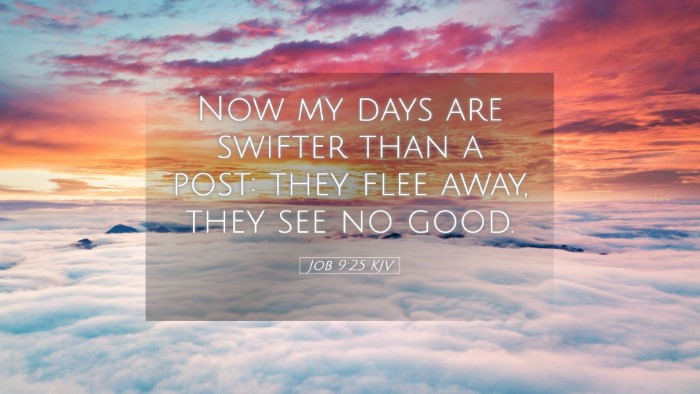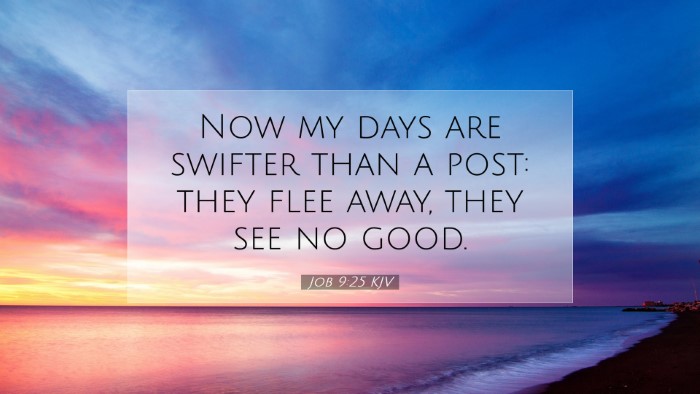Commentary on Job 9:25
Job 9:25 states, "Now my days are swifter than a post: they flee away, they see no good." This verse captures the sense of urgency and transience within human existence, highlighting a deep emotional and theological reflection. The commentaries of Matthew Henry, Albert Barnes, and Adam Clarke provide critical insights into the meaning and implications of this passage.
Contextual Overview
Job, a figure of unparalleled suffering, finds himself in a discourse concerning his afflictions and the nature of divine justice. The surrounding context is vital; Job is grappling with the apparent silence of God amidst his suffering, prompting him to reflect on the brevity of life.
Insights from Public Domain Commentaries
Matthew Henry's Commentary
Matthew Henry presents a profound interpretation of Job’s lamentation. He emphasizes the fleeting nature of human life, likening it to a swift messenger. Job's assertion, "my days are swifter than a post," serves as a metaphor for life’s rapid progression.
- Immediacy of Life's Experiences: Job's statement conveys a sense of urgency. Life passes quickly, and with it, opportunities for fulfillment seem to vanish.
- The Perception of Goodness: The phrase "they see no good" reflects Job's despair. This lack of goodness the days observe stresses how suffering can obscure the perceived blessings of life.
- Application to Spiritual Life: Henry calls on readers to heed Job's reflections as a reminder about the stewardship of time and life's fragility, urging the faithful to utilize their days wisely in service and worship.
Albert Barnes' Commentary
Albert Barnes expands on this theme, stating that Job's observation is not merely personal lamentation but extends universal truths about life's fleeting moments. Barnes categorizes Job's reflections into three primary observations:
- The Swiftness of Time: Barnes notes that the word "post" can refer to a messenger who is sent with haste; therefore, Job's metaphor emphasizes the rapid flow of time which, once lost, cannot be retrieved.
- Illumination of Suffering: According to Barnes, Job's contemplation leads him to a state of existential anxiety; he questions the purpose of days that pass without relief from suffering.
- The Call for Recognition: Barnes urges readers to recognize that life's brief nature calls for urgent response to the divine and an active engagement in righteousness to mitigate the sorrow of existence.
Adam Clarke's Commentary
Adam Clarke notes that Job is intensely aware of his mortality in this verse. Clarke remarks upon the following aspects:
- Mortality's Weight: Clarke discusses how Job's awareness of time's swift passage presses upon him the reality of human existence—each day fleeting without guarantee of goodness or hope.
- Theological Implications: Clarke speculates on the overarching themes of divine justice, suggesting that suffering is not merely punitive but reflective of the complexities of the human experience in a fallen world.
- Encouragement for Reflection: Clarke challenges the reader to consider how this notion of time's swiftness should provoke deeper reflection on personal faith, encouraging an active search for meaning in a world laden with transience.
Conclusion and Theological Reflection
Collectively, these commentaries contribute to a rich understanding of Job 9:25. The verse serves as a powerful reminder of life's fleeting nature and the existential questions it raises. For pastors, theologians, and students, the insight drawn from these public domain commentaries provides a profound platform for engaging with themes of suffering, the nature of time, and the quest for divine justice.
In a world often characterized by haste, the verse invites reflection on the quality of our days and our approach to chronicling both joy and grief. It beckons believers to embrace their moments, find meaning in their days, and maintain hope even in the shadows of profound despair.


